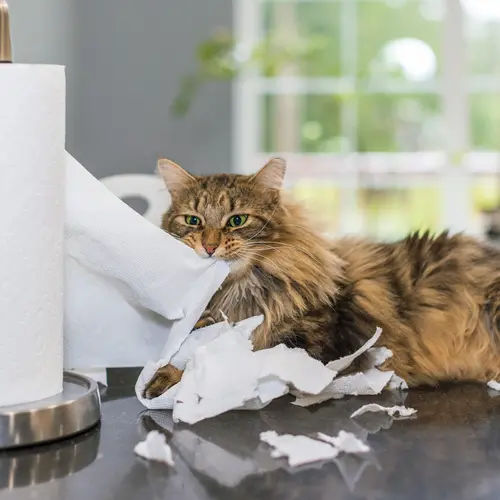Whether your cat is a picky eater or gobbles up everything in sight, it helps to set a few basic rules when it comes to their food. That can help you avoid some common cat food mistakes.
Close the Kitty Buffet
Many cat owners make a point to leave a full food bowl out all day, especially if their cat is a picky eater. But it’s better to stop them from grazing. If food is only out at certain times, even the choosiest of cats should eventually eat. Also, you may want to talk to your veterinarian about the best feeding schedule for your pet’s age -- kitten, adult, and senior.
The healthiest way to feed a feline is to start with a little less than the daily amount suggested on the bag or can. Use the directions as a guideline. Also, feeding your cat multiple meals (two or three) every day will help set a schedule and give you an idea how much or how little they are eating. You may want to consider using automatic and puzzle feeders to promote hunting instincts
Scraps Are Off the Table
Some of the foods on your plate aren’t healthy for your kitty. Even if they beg, don’t be tempted to feed them grapes, raisins, onions, nuts, chocolate, garlic, and uncooked bread dough. Raw meat or eggs and bones are also dangerous.
Why? Sudden changes in your cat’s diet can lead to vomiting and diarrhea. In some cases, those with sensitive digestive systems can get pancreatitis from eating table scraps, which can be fatal. Raw meat and eggs can have harmful bacteria, and your kitty could choke on bones or risk getting a piece of one stuck in their digestive tract. Other foods such as those listed above are considered toxic.
And it’s best to skip the saucer of milk. If your cat’s body doesn’t have the right enzymes (which most cats' bodies don't) to break down lactose (the sugar in milk), they could get very sick.
Feeding a Fat Cat
A portly pussycat may look extra cuddly, but it’s unhealthy for cats to carry around too much weight. It makes them more likely to get all kinds of illnesses, including liver problems, joint pain, and diabetes.
But how should you feed a cat who needs to slim down? Talk to your vet. They can help you figure out the best amount and schedule. If your cat bothers you for food between meals, pet or play with them instead. Cut down on their snacks and treats, and try giving them several small meals throughout the day. (Always feed them in their bowl, not anywhere else.) And make sure they have enough fresh water.
Can a Cat Go Vegetarian?
If you’re a vegetarian, you might think your cat should be one, too. Think again. Cats are natural carnivores and their tummies are designed to digest meat. A vegetarian diet won’t give your kitty the nutrients they need. For example, if cats do not eat enough of the amino acid taurine, which only comes in meat, they can get heart failure.
What about raw diets? The jury is still out. No studies have shown that raw animal products are better than any other types of cat food (canned, dry, or home cooked) with one exception: Usually raw meats are slightly easier for them to digest than cooked meats. There are plenty of risks to raw diets, too. So before you start it for your cat, talk to your veterinarian to make sure your pet can handle it.

